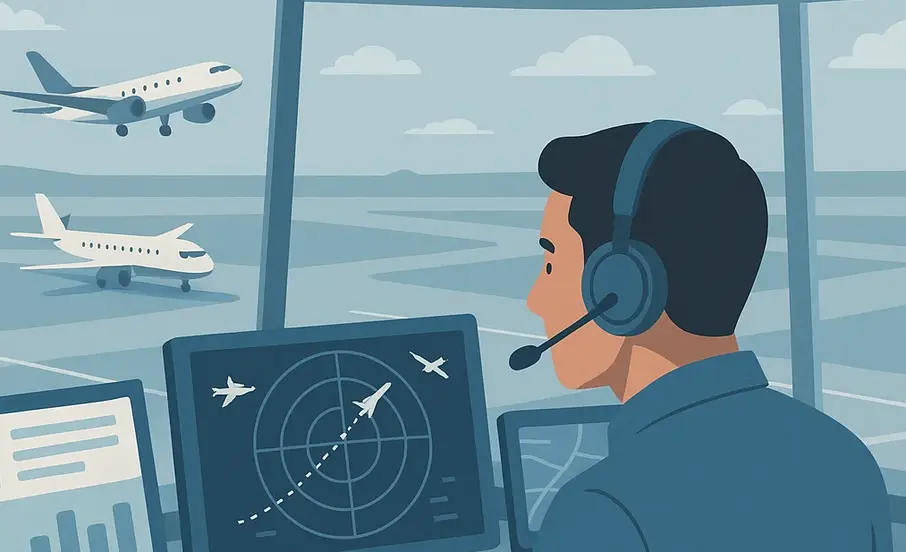Home » Job Description » Air Traffic Controller
Air Traffic Controller
https://www.whatjobs.com/info/hire/job-description/air-traffic-controller

An Air Traffic Controller is a highly skilled aviation professional responsible for directing aircraft movements safely and efficiently within the airspace system and on the ground at airports. They monitor aircraft using radar, computers, and visual references while providing instructions, clearances, and advice to pilots. Air Traffic Controllers maintain continuous communication with pilots to ensure proper separation between aircraft, prevent collisions, minimize delays, and handle emergencies. This role requires exceptional concentration, spatial awareness, decision-making abilities, and the capacity to remain calm under pressure.
Duties and Responsibilities
- Direct aircraft movements on the ground and in the air to maintain safe separation
- Issue takeoff, landing, and taxiing clearances to aircraft
- Monitor aircraft positions using radar, computer systems, and visual observation
- Provide pilots with critical information about weather conditions, runway closures, and potential hazards
- Coordinate aircraft movements with other air traffic control facilities and airport operations
- Respond quickly and effectively to emergency situations and unusual circumstances
- Maintain accurate flight progress records and documentation
- Transfer control of aircraft to adjacent air traffic control facilities as needed
What does an Air Traffic Controller do?
An Air Traffic Controller manages the safe and orderly flow of air traffic by communicating with pilots, monitoring aircraft movements, and making rapid decisions to ensure safety in the national airspace system. They coordinate with other controllers and facilities while adhering to strict protocols and procedures, even during high-pressure situations, weather disruptions, or emergencies.
Skills and Qualifications
- Exceptional spatial awareness and visualization abilities
- Superior communication skills with clear, concise verbal delivery
- Outstanding decision-making capabilities under pressure
- Strong mathematical aptitude and problem-solving skills
- Excellent memory and attention to detail
- Ability to maintain focus during extended periods of concentration
- Proficiency with specialized air traffic control equipment and software
- Capacity to work rotating shifts, including nights, weekends, and holidays
Salary Expectations
$70,000-$130,000 annually, depending on facility level, experience, and location. Federal air traffic controllers may receive locality pay adjustments and premium pay for night shifts, Sundays, and holidays. Comprehensive benefits packages typically include retirement plans, health insurance, and paid leave.
Education and Training Requirements
- Associate’s or Bachelor’s degree preferred (though not always required for FAA applicants)
- Successful completion of the FAA Air Traffic Controller training program at the FAA Academy
- Passing score on the Air Traffic Selection and Training (AT-SAT) exam
- Medical clearance including vision, hearing, and psychological evaluations
- Security background check and drug screening
- Continuous training and proficiency checks throughout career
Experience Requirements
- Must be a U.S. citizen (for FAA positions)
- Must begin training before age 31 (for FAA positions)
- Prior air traffic control experience from military service is highly valued
- Previous aviation experience or education is beneficial
- Must demonstrate the ability to learn and apply complex procedures and regulations
- Experience with high-pressure decision making is advantageous
Job Description Samples for Similar Positions
- Flight Dispatcher: Prepares flight plans and monitors flights but does not directly control aircraft movements.
- Airspace System Specialist: Focuses on designing, implementing, and maintaining air traffic control systems and procedures.
- Aviation Safety Inspector: Ensures compliance with federal aviation regulations through inspections and oversight.
Job Description Example: Associate Air Traffic Controller
Associate Air Traffic Controller
An Associate Air Traffic Controller works under the supervision of experienced controllers while developing the skills necessary for independent air traffic control responsibilities. They assist with monitoring aircraft movements, communicating with pilots, and maintaining situational awareness while gradually taking on more complex control scenarios during their training period.
Duties and Responsibilities
- Observe and assist certified controllers with air traffic operations
- Practice handling progressively more complex traffic scenarios under supervision
- Develop proficiency with air traffic control equipment and procedures
- Study airspace configurations, regulations, and facility-specific protocols
- Participate in simulation training exercises and skill assessments
- Maintain required training documentation and progress reports
- Communicate with pilots and other controllers under supervision
Skills and Qualifications
- Strong aptitude for air traffic control concepts and procedures
- Excellent communication skills and clear speaking voice
- Ability to receive and apply constructive feedback
- High level of discipline and commitment to learning
- Capacity to remain calm in stressful situations
- Basic understanding of aviation principles and terminology
- Willingness to adhere to strict protocols and procedures
Salary Expectations
$40,000-$65,000 annually during training period, increasing substantially upon certification.
Education and Training Requirements
- Successful completion of initial FAA screening and selection process
- Ongoing participation in the multi-phase FAA training program
- Regular performance evaluations and proficiency assessments
- Commitment to continuous learning and skill development
Experience Requirements
- Meet all basic qualifications for air traffic controller candidates
- Successful completion of pre-employment testing and assessments
- Demonstrated aptitude for air traffic control concepts
- No specific prior experience required beyond meeting FAA entry requirements